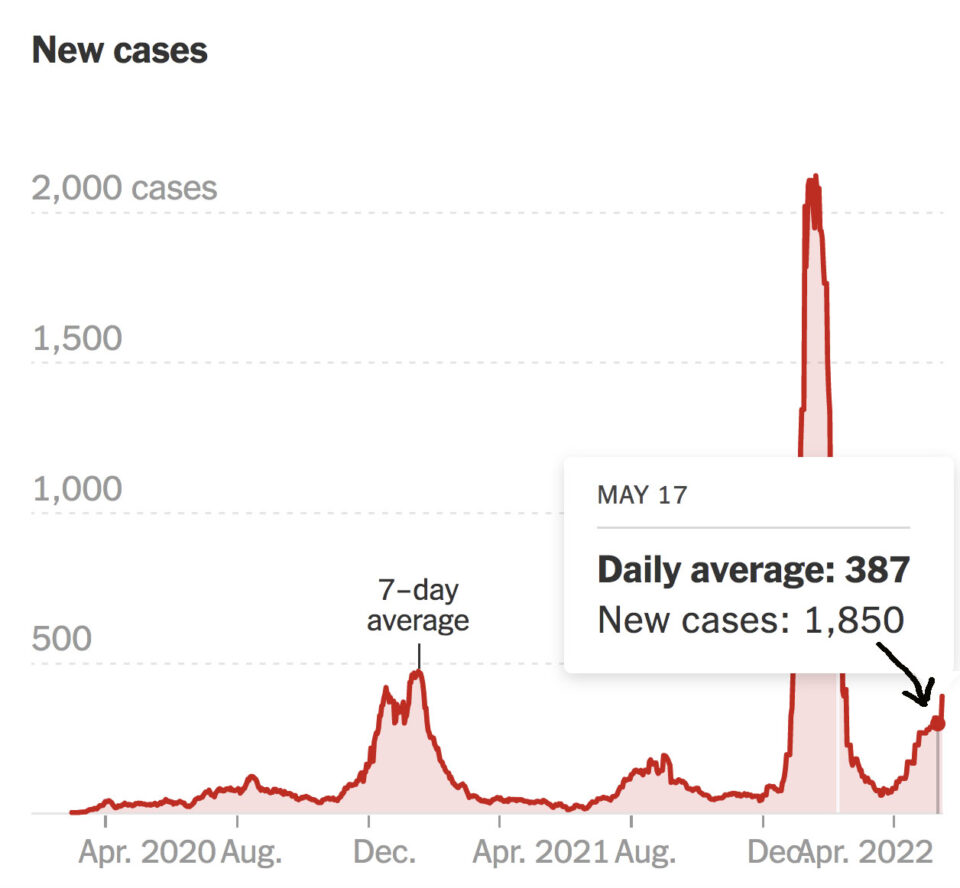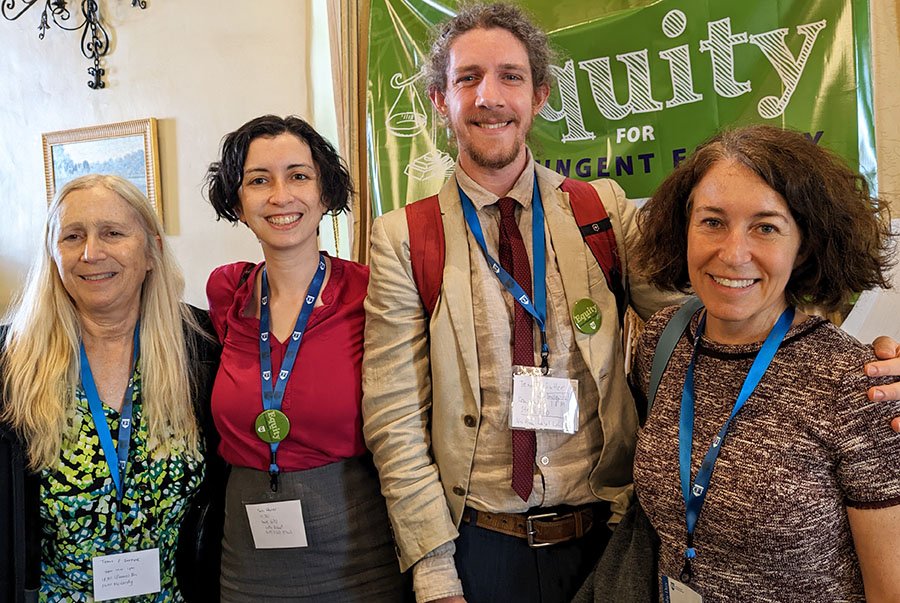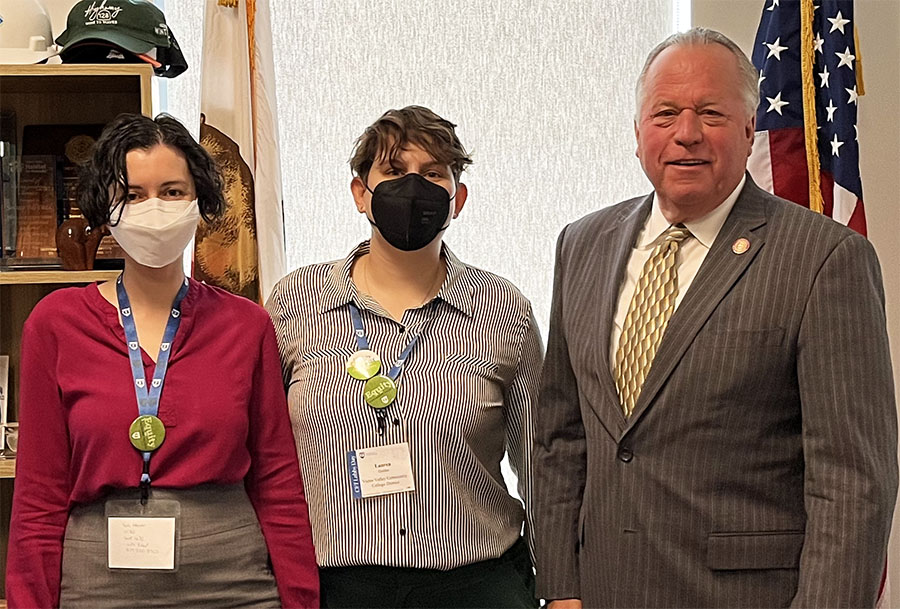Workload program
Workload Pilot Project FAQs
[Related: Read “Why we are piloting the workload point system”]
WHAT is the workload pilot project & why do we have it?
Full-time workload has increased unsustainably over the last decade, with no accounting for the time spent on hiring, evaluations, committee work, etc., leading to faculty burnout and demoralization. Over the years, our faculty union attempted to address this issue during contract negotiations. During our last bargaining cycle, AFT proposed a pilot project to quantify full-time faculty workload, with the goal of setting reasonable limits, and both the district and AFT signed off on it. Because it is new and a pilot, there will be areas that are incomplete or confusing. We hope this FAQ will help.
WHICH academic years does the 2-year workload pilot project cover?
Academic years 2022-23 & 2023-24.
WHERE can I read the specific contract language describing this project?
See Article 6.5. Workload Pilot Project, which starts at the bottom of the linked page. It’s a short read: less than two pages of narrative, followed by a list of activities and the points assigned to each activity. Points required of counselors are in Article 7.6, for librarians in Article 7.7, and for nurses and faculty assigned to other duties in Article 7.8.
WHAT do full time faculty members need to do to participate?
As stated in Article 6.5 of our contract, faculty must submit a professional plan in May for the following academic year, showing which activities you plan to carry out during the upcoming year. A table on pages 13-14 of the contract lists the points associated with different activities.
WHEN do we have to submit the professional responsibilities plan?
By the end of May.
HOW many points should a faculty member plan to do during an academic year?
Instructional faculty need to do 6-7 points (Article 6.5), counselors need to do 5 points (Article 7.6), and librarians need to do 4 points (Article 7.7). Nurses, instructional designers, and faculty coordinators do not need to do any points and are not required to complete a professional responsibilities plan (Article 7.8).
IF an activity is not included on the list, does it have a default point value of 0.5?
No!
WHAT if an activity we plan to pursue isn’t included on the list?
The faculty member and supervisor may jointly include items that are not on this list, add them to one of the tiers, and assign points to the activity.
WHO can we contact if we have an issue, such as a disagreement with my dean?
An overview committee has been set up to help with any issues that arise. The committee is made up of one rep from AFT (Steve Lehigh), DAS president (Kate Browne), and Aaron McVean and David Feune from district administration. Faculty members can contact Steven Lehigh at lehigh@aft1493.org.
IS the Formstack that the district created and that some deans are distributing to faculty required?
No, this form is not required. Faculty may find it useful, but it is not a requirement to use it. You can write up your plan and submit it to your dean without the form. Note: the form-stack has been found to incorrectly restrict or interpret the implementation of the pilot program.
WHERE can we get the Formstack?
https://smccd-czqfp.formstack.com/workflows/faculty_professional_responsibilities_form?sso=6234b8dfe3544
(Note: as of the morning of 4/27, the Formstack appears to be down, perhaps temporarily.)
ARE the activities a faculty member lists on their plan only accepted if your Dean approves?
The plan must be approved by the Dean, unless a) the plan includes activities for which there is no institutional need during the academic year covered by the plan; b) the plan includes activities for which the demand exceeds supply; or c) there is an institutional need for a professional activity that an insufficient number of faculty have included in their plans.
CAN a plan be modified once the academic year starts?
Yes, plans can be modified if the dean and faculty member mutually agree to do so.
CAN instructional faculty decide to do more than 7 points over the course of a year?
Generally, no. Voluntary additional service in excess of 7 points for instructional faculty / 5 for counselors / 4 for librarians does not result in additional compensation. (See next question for a complete answer.)
CAN deans force instructional faculty to do more than 7 points?
If the faculty member is required to exceed 7 points by the Dean, the faculty member may appeal to the workload pilot review committee; or agree to go over 7 points and be compensated for the additional service at the special rate for the actual hours spent; or (only in the first year of the pilot) opt to receive credit for the following year. For counselors use 5 points and for librarians use 4 points.
WHAT is the difference between professional responsibilities (non-teaching workload) and professional development, such as attending Flex days?
Professional development is not the type of activity that can be included in your professional workload plan, but these activities can be listed on your Flex form.
HOW do we determine points for standing committees that run during both spring and fall?
Committees that run for two semesters count once for the entire academic year. (Ex: 3 points for the entire year)
CAN I count points for supervising individual students doing research projects, such as working with Honors students?
Supervising Independent Study is capped at one student per academic year unless it is requested by the Dean. However, there is no provision in the pilot for working with Honors students. You can try checking with your Dean or appealing to the review committee.
WHAT is the definition of what it means to “serve as department lead?”
By definition, if you are the only full-timer in your discipline, you are the department lead – unless you have reassigned time for certain departmental duties – in which case you can only claim points for the duties that are not included in your reassigned time. There is no single definition of what it means to “serve as department lead” because this term is often discipline-specific.
CAN we choose to carry over points to the following year or bank points?
Only in the first year of the pilot – unless we negotiate a continuation of the program in the future that allows for carrying over points after the first year.
WHAT happens if you are under points? Are there penalties?
The contract applies to all faculty, and all faculty must participate in the pilot program. By June 15, 2023, faculty must submit a professional responsibilities report showing the activities undertaken in 2022-2023 and their status/progress. The contract does not specify any penalties for not completing all points.
CAN we count points for pursuing a graduate program of study?
No, this is not an activity included in the workload pilot.
IF you receive reassigned time, can you list those activities on your plan?
No, reassigned time can’t be considered for workload points.
CAN we share our plans with other faculty in our departments or divisions?
Yes, this can be very helpful. Some faculty are already collaborating in this way.




